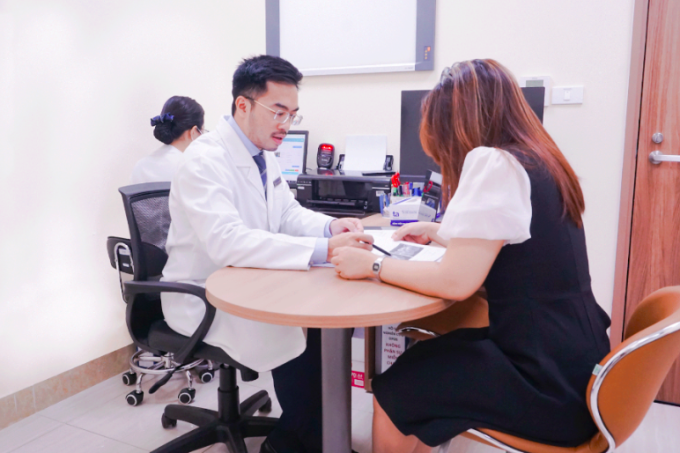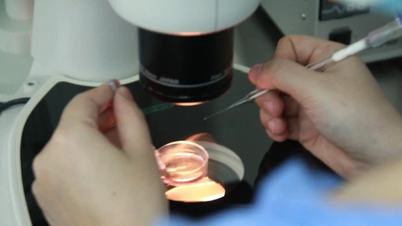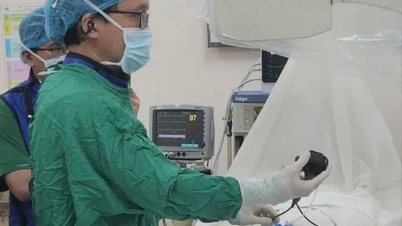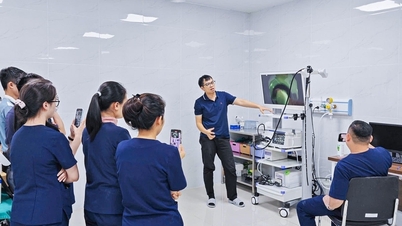After consecutive miscarriages and having to remove one of her fallopian tubes, Phuong Thao's ovaries aged like those of a menopausal woman, unable to get pregnant naturally.
Nguyen Phuong Thao (23 years old, Ho Chi Minh City) and her husband Dinh Tuan Hai (35 years old) got married in 2019. Not long after the wedding, Thao became pregnant with triplets, but unfortunately miscarried at the 8th week. A year later, Thao became pregnant again but miscarried again due to an ectopic pregnancy. This situation happened two more times in a row, making her depressed.
"In 3 years, I had 4 miscarriages and had to have one fallopian tube removed. I was in great pain because I lost my children continuously and the doctor said I could not get pregnant naturally," Thao said.
Knowing his wife's desire to have children, Thao's husband encouraged her to undergo in vitro fertilization (IVF). In early 2023, they went to the Center for Reproductive Support, Tam Anh General Hospital, Ho Chi Minh City (IVFTA-HCMC).
Doctor Le Xuan Nguyen, who directly provided Thao with assisted reproductive treatment, said that of the four miscarriages, three were ectopic pregnancies and one was multiple pregnancies. All four were classified as early miscarriages, meaning the pregnancy ended in the first weeks of pregnancy. The patient was very young but had irregular periods, had multiple miscarriages, and had a history of abnormal pregnancies, so the doctor ordered paraclinical tests to find the cause.

Doctor Le Xuan Nguyen examines and consults on treatment options for patients. Photo: Hoai Thuong
The patient's uterine cavity was normal, the right fallopian tube was cut, the left fallopian tube moved very slowly. Thao's number of follicles was also very small, the ultrasound at the beginning of the menstrual cycle showed that one ovary had 4 follicles, the other had 3 follicles. Meanwhile, compared to other women of the same age, the number of follicles was at least over 10. The ovarian reserve index AMH was only 0.67, very low and was the biggest difficulty in the patient's journey to find a child. With this condition, if IVF continued to be delayed, the quantity and quality of follicles would decrease, making it difficult to have children.
Thao was quickly given an egg stimulation protocol by doctors, 5 mature eggs were retrieved, and 5 embryos were cultured on day 5. In early May, Thao received the good news of pregnancy after the first embryo transfer. Doctors closely monitored her pregnancy to prevent miscarriage in high-risk groups.
"Thanks to the embryo culture system integrated with artificial intelligence (AI) in the lab, the number of eggs retrieved is very small but the embryo creation success rate is 100% and the embryo quality is very good, increasing the patient's chance of successfully having children," Dr. Nguyen shared.
According to Dr. Nguyen, abnormalities in embryo quality are also one of the causes of consecutive miscarriages. Normally, a couple in the fertilization process still has a rate of about 25% to create abnormal embryos, leading to abnormal pregnancy forms such as multiple pregnancies, biochemical pregnancies, miscarriages... However, the AI dynamic embryo culture system at IVFTA-HCMC can observe and screen for abnormalities in the division process of embryos from very early stages, limiting the causes of embryos.
IVF technique also helps the embryo to be transferred into the lining of the uterus, limiting the risk of ectopic pregnancy causing miscarriage. In many cases, ectopic pregnancy also threatens the health and life of the pregnant woman.
At IVFTA-HCMC recently, doctors have also received and treated many young patients with consecutive miscarriages, ovarian failure like women in pre-menopause, and infertility diseases. On average, every day, doctors examine and advise on reproductive support methods for 4/10 cases aged 20-23 with the above conditions, although previously there was only about one young patient per day.
The increase in young patients being examined for reproductive diseases, consecutive miscarriages, and infertility may be due to the fact that young people have more and more access to reproductive knowledge, so they proactively go to the hospital for examination and treatment when they detect abnormalities or have not had children for more than a year. "This is a positive sign, because early detection and treatment help patients increase their chances of successfully getting pregnant and giving birth to healthy children," Dr. Nguyen emphasized.
There are many reasons why women suffer from premature ovarian failure, such as chromosomal diseases, genetic diseases, autoimmune diseases or the removal of one or both ovaries or fallopian tubes during treatment. Doctor Nguyen recommends that women who have symptoms of menstrual disorders, sparse, scanty, or gradually decreasing periods should go to a medical facility to have their reproductive health checked as soon as possible.
At 8:00 p.m. on May 25, 2023, the Online Consultation program "Female infertility due to ovarian failure, reduced ovarian reserve (low AMH) & egg storage for motherhood" will take place with the participation of experts from the IVFTA-HCMC Center: MSc. Dr. Giang Huynh Nhu - Director of the Center; Dr. Ngo Dinh Trieu Vy - Center Doctor; Dr. Pham Thi My Tu - Center Doctor. The program will be broadcast live on the VnExpress fanpage, Tam Anh General Hospital. Interested readers can ask questions here. |
Nostalgia
* Patient's name has been changed.
Source link



![[Photo] Prime Minister Pham Minh Chinh attends the World Congress of the International Federation of Freight Forwarders and Transport Associations - FIATA](https://vphoto.vietnam.vn/thumb/1200x675/vietnam/resource/IMAGE/2025/10/08/1759936077106_dsc-0434-jpg.webp)



![[Photo] Prime Minister Pham Minh Chinh inspects and directs the work of overcoming the consequences of floods after the storm in Thai Nguyen](https://vphoto.vietnam.vn/thumb/1200x675/vietnam/resource/IMAGE/2025/10/08/1759930075451_dsc-9441-jpg.webp)











![[Video] Proposal to increase special allowances for civil servants and health officials](https://vphoto.vietnam.vn/thumb/402x226/vietnam/resource/IMAGE/2025/10/09/1759968189853_720-jpg.webp)

















































































Comment (0)